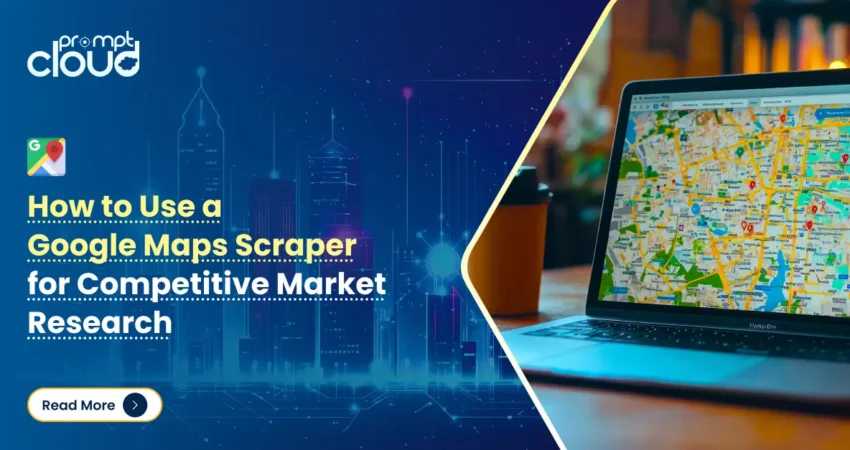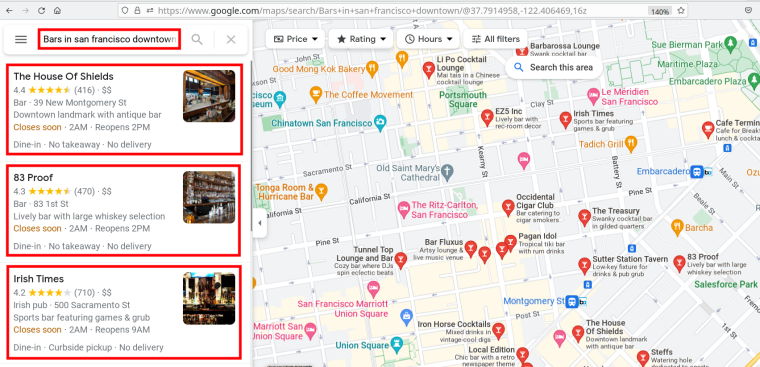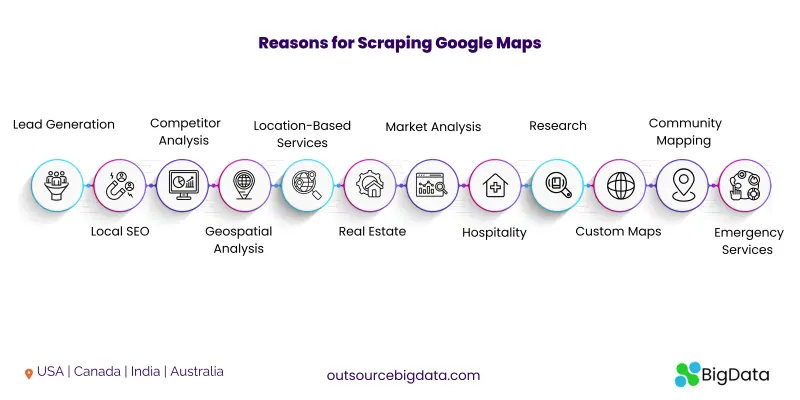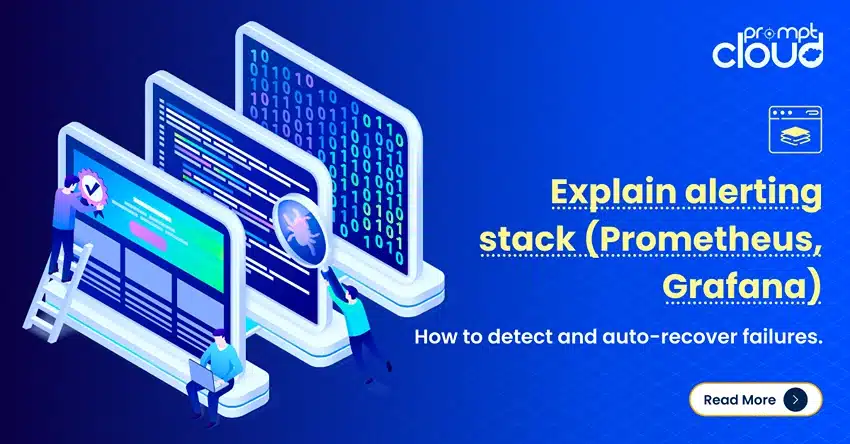
Think Google Maps is just for finding the nearest coffee shop? Think again. Beyond directions and traffic updates, it’s one of the world’s largest business directories, packed with data on millions of companies across industries.
Over 1 billion people use Google Maps to find service providers and local eateries monthly. Any search query entered can yield valuable business intelligence.
If you are a business owner, marketer, or even a data analyst, the information offered on Google Maps, such as business names, contact details, and customer reviews, provides intelligent market insight wherein you can study competitors and track market trends to uncover new opportunities.
Collecting data manually may be inefficient and time-consuming, but a Google Maps scraper is there to assist you. It automates the process and retrieves structured business data in a matter of minutes.
We’ll take a closer look at how a Google Maps scraper functions, examine how it enhances competitive market research, and understand how it can strategize your gains in the following sections. Buckle in.
What is a Google Maps Scraper?
A Google Maps scraper is one of the tools in business intelligence that seeks to automate the collection of business details from Google Maps. Instead of looking for all the details by hand, a scraper does that in a few minutes by keeping all the details in a certain order.

Image Source: Botster
What Data Can You Extract with a Google Maps Scraper?
Google Maps scraper can retrieve various types of data related to a business, including:
• Business Names: Help get information about the competitors and partners for the business.
• Addresses and Locations: Find out the concentration of various businesses in a particular place for focused research.
• Contacts (Phone Numbers & Websites): Retrieve a lot of data to be used in follow-up campaigns.
• Ratings and Reviews: Conduct customer sentiment analysis.
• Business Categories: Classify competitors in terms of their line of business.
• Opening Hours: Analyze operational patterns of different businesses across various industries.
A Google Maps scraper helps perform many tasks for the business, such as estimating sales volume and gauging market competition.
Key Benefits of Scraping Google Maps for Market Research

Image Source: OutsourceBigData
1. Identifying Top Competitors in a Region
Google Maps scrapers can serve as an automated competitor analysis tool. Businesses can pull information on competitors in a specific area, extracting their locations, region-specific reviews, and the types of businesses ascribed to those given locations.
For instance, a restaurant franchise intending to expand can use data obtained from Google Maps scraping to identify locations with high customer demand and limited competition. Retail brands also study the rating of competing brands, their location, and the customer’s rating and formulate plans to enter the market.
2. Understanding Customer Sentiment Through Reviews
Using a Google Maps data scraper, companies can scrape thousands of reviews and analyze customers’ likes and dislikes with respect to the business. Customer reviews available on Google Maps hold valuable information regarding the positive and negative attributes of a business and help in identifying customers’ do’s and don’ts.
Take, for instance, a video rental outlet trying to compete in the industry. This outlet’s data can be compared with customer reviews from hotels of his or her top competitors and identify whether the guests complain about the quality of service, cleanliness, or pricing of the hotel’s services. This will enable him or her to improve service offering as well as provide other uses of these services.
3. Finding Gaps in the Market and Expansion Opportunities
Using a Google Maps scraper, businesses can determine geographical areas of low demand in their sector. For instance, a fitness studio can scrape gym data for a city and identify areas with high population concentrations and fewer competing gyms.
Business location data analytics enable firms to make optimal location selection decisions for new branches based on customer traffic patterns.
4. Generating High-Quality B2B Leads
For sales and marketing professionals, Google Maps offers invaluable opportunities for lead generation. By scraping the relevant contact information, businesses can customize calls or emails to targets and offer them relevant solutions.
A digital marketing firm, for instance, could optimize Google Maps scrapers to obtain information about the local businesses around and craft targeted marketing campaigns for specific sectors. They could tailor their offers according to the type of business and the region in which it is situated.
Who Can Benefit from Scraping Google Maps?
One would think Google Maps scrapers would only be useful for large companies and sophisticated analysts, but that is not the case. Companies, regardless of their scope and industry, can access Google Maps for data that would enable them to make calculated decisions. Here is who stands to benefit the most:
1. Business Analysts & Competitive Intelligence Professionals
As it is evident in the name, every business has competitors, and identifying one’s competitors forms a basic part of business strategy. Google Maps scraping can help analysts track business locations, population density, competitors’ physical presence, and what the customer’s perception towards them is. A business can be aided in making expansion and pricing decisions by trying to fill gaps in the market and analyzing regional trends.
2. Marketers & Lead Generation Teams
To capture target audiences, Google Maps can be used to extract business names, numbers, and even addresses, which can assist the marketing team in compiling targeted outreach lists. An illustration is a digital marketing agency that could scrape data for SEO and send tailored email campaigns to local businesses that may require such services.
3. Franchise & Retail Expansion Teams
For retail businesses and franchises, location is arguably the most important factor. Using Google Maps Scrapers, expansion teams can analyze locations for competitor presence, areas of high demand, and find the location that has the highest potential for growth.
4. Sales Teams & B2B Companies
A Google Maps scraper is an invaluable tool for sales representatives who wish to search for potential clients within specific sectors. A case study is a software firm that markets and sells POS systems to restaurants. Such a company can scrape contact information for countless restaurants across different regions.
5. Real Estate & Property Development Firms
Real estate developers and investors can study the concentration of businesses in certain areas to assess their commercial potential. Knowing the geographical distribution of businesses in a city greatly assists in making sound investment decisions.
6. Startups & Entrepreneurs
Google Maps can be of assistance for startups trying to gauge new markets by showing them unserviced zones, areas of customer dissatisfaction, and collaboration opportunities. Insights from Google Maps scraping can inform business strategy, whether it is a new food delivery service or a unique retail shop.
Extracting data from Google Maps is more than just accumulating information; it is the process of transforming data into clear steps to take. No matter your industry, having this information organized will improve your market position.
Best Google Maps Scraper Tools: Free vs. Paid Options
The options available to scrape Google Maps range from free Google Maps scraper tools to sophisticated paid tools. Below is a comparison of some of the best tools:
| Tool Name | Free Version? | Features | Best For |
| WebScraper.io | Yes | Browser extension, easy setup, exports to CSV | Beginners, small-scale projects |
| Octoparse | Yes (limited) | Cloud-based, no coding required, high data volume | Businesses needing automation |
| Scrapy (Python-based) | No | Open-source, highly customizable | Developers & data scientists |
| Bright Data | No | Large-scale scraping, proxy management | Enterprise-level data extraction |
Each of them has its set of advantages and drawbacks and the optimal one greatly depends on individual business requirements. Non-paid Google Maps scraper tools are useful for smaller projects but paid alternatives offer more automation, scalability, and greater support.
Best Google Maps Scraper Services
For people looking for high-quality Google Maps data and who do not want to bother with building and maintaining scrapers, Google Maps scraper services are a more viable option. These services feature customized data collection solutions that enable you to obtain prepared information without going through scraping restrictions.
PromptCloud: The Best Google Maps Scraper Service
PromptCloud is an industry leader in offering Google Maps data scraping services along with other tailored web scraping solutions. PromptCloud differs from generic scraping tools in the following ways:
- Custom data extraction – Extract specific business details based on your unique requirements.
- High-quality, structured data – Receive data in ready-to-use formats such as CSV, JSON, or Excel.
- Legal and compliant scraping – PromptCloud ensures compliance with Google’s policies while collecting publicly available data.
- Scalability – Whether you need thousands or millions of records, PromptCloud can handle large-scale data extraction.
- 24/7 Support and Maintenance – No need to worry about scraper downtime or maintenance.
With PromptCloud’s Google Maps scraper service, businesses can focus on data analysis and make strategic decisions without worrying about the hurdles of web scraping.
How to Use a Google Maps Data Scraper Effectively
1. Choosing the Right Tool or Service
Before proceeding further, a business must decide on whether it requires a Google Maps scraper tool or a customized scraping service, such as PromptCloud.
2. Setting Filters and Scraping Parameters
To extract relevant data, it’s important to define specific filters such as:
- Location (city, state, or country)
- Business category (e.g., restaurants, real estate agencies)
- Minimum review rating (e.g., 4.0 and above)
3. Cleaning and Analyzing the Extracted Data
Businesses need to clean the data by removing duplicates, correcting errors, and formatting the data before analysis. Lists that have been compiled through scraping contain inconsistent and redundant details, making them difficult to read.
4. Turning Raw Data Into Actionable Insights
The final step is to transform collected data into meaningful insights, such as:
- Identifying key competitors and their market positioning
- Finding regions with high demand but low supply
- Creating targeted marketing campaigns based on extracted contact details
- Improving service offerings based on customer reviews
Why Choose PromptCloud For Google Maps Data Extraction
For businesses seeking to analyze competition, scrape leads, and acquire new markets, a Google Maps scraper is highly beneficial. Nonetheless, extracting data through Google Maps requires careful handling of legal policies as well as high-grade data processing techniques.
Using PromptCloud’s web scraping solutions, businesses are liberated from the trouble of dealing with unstructured and erroneous data through our optimized Google Maps data extraction services.Looking for a dependable data source for Google Maps for your market research? Get in touch with PromptCloud today for custom web scraping solutions!



















